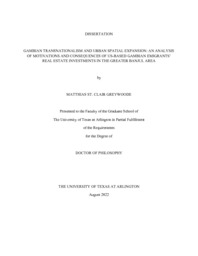
ATTENTION: The works hosted here are being migrated to a new repository that will consolidate resources, improve discoverability, and better show UTA's research impact on the global community. We will update authors as the migration progresses. Please see MavMatrix for more information.
Show simple item record
| dc.contributor.advisor | Hissong, Rod | |
| dc.creator | Greywoode, Matthias St. Clair | |
| dc.date.accessioned | 2023-06-29T20:39:26Z | |
| dc.date.available | 2023-06-29T20:39:26Z | |
| dc.date.created | 2022-08 | |
| dc.date.issued | 2022-08-12 | |
| dc.date.submitted | August 2022 | |
| dc.identifier.uri | http://hdl.handle.net/10106/31435 | |
| dc.description.abstract | This study was the first comprehensive study of the transnational housing investments of Gambian emigrants in the Gambia and contributes to the literature on immigrant populations in host countries by illuminating the transnational nature and activities of immigrant populations. Transnational migrants send significant amounts of remittances back to their countries of origin annually and research indicates that they continue to grow both in real terms and as a proportion of their country’s respective GDP. Most of these migrant remittances are invested in residential housing developments which makes studying the impact of migrant investments on the economies of origin countries an important research focus. Gambian emigrants in the United States account for 40% of total annual remittance inflows to The Gambia even though they represent a disproportionate 19% of the total Gambian emigrant stock and have been blamed for the serious house price appreciation in the country.
This study sought answers to why Gambian emigrants in the United States engage in transnational housing investments in their country of origin and to what extent those investments contribute to the decentralization of population within the Greater Banjul Area (GBA). The study collected data using document and archival analysis for context, questionnaire survey of Gambian emigrants in the U.S as a baseline, semi structured interviews of Gambian emigrants, Gambia government officials, and real estate professionals in The Gambia. The data collected were analyzed using thematic analysis for coding to identify patterns that were used to focus the analysis on specific categories. The researcher found that Gambian emigrants were motivated to invest in transnational housing in The Gambia first for investment income, second for a place to stay while on vacation, third for family members, and fourth for a home during retirement. The study found that housing investments by Gambian emigrants resulted in a general change in architectural styles away from compound-style housing towards low-density single-family residential development at the GBA periphery contributing to the decentralization of population within the GBA. This process is aided by the higher incomes of Gambian emigrants relative to their local Gambian counterparts and road network expansions by the government. | |
| dc.format.mimetype | application/pdf | |
| dc.language.iso | en_US | |
| dc.subject | Gambian diaspora | |
| dc.subject | Remittances | |
| dc.subject | Transnational housing investment | |
| dc.subject | Urban spatial expansion | |
| dc.title | GAMBIAN TRANSNATIONALISM AND URBAN SPATIAL EXPANSION: AN ANALYSIS OF MOTIVATIONS AND CONSEQUENCES OF US-BASED GAMBIAN EMIGRANTS’ REAL ESTATE INVESTMENTS IN THE GREATER BANJUL AREA | |
| dc.type | Thesis | |
| dc.date.updated | 2023-06-29T20:39:26Z | |
| thesis.degree.department | Urban and Public Affairs | |
| thesis.degree.grantor | The University of Texas at Arlington | |
| thesis.degree.level | Doctoral | |
| thesis.degree.name | Doctor of Philosophy in Urban Planning and Public Policy | |
| dc.type.material | text | |
| dc.creator.orcid | 0000-0002-0894-3914 | |
Files in this item
- Name:
- GREYWOODE-DISSERTATION-2022.pdf
- Size:
- 2.272Mb
- Format:
- PDF
This item appears in the following Collection(s)
Show simple item record


